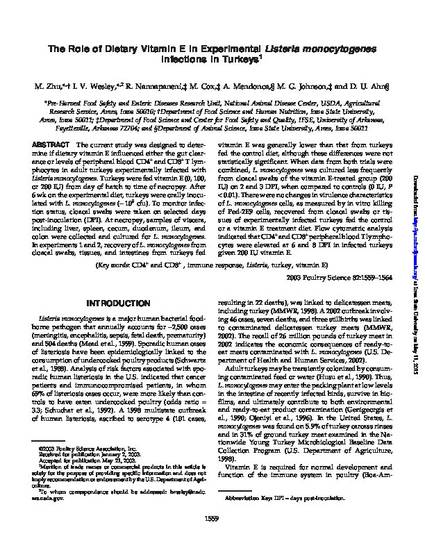
The current study was designed to determine if dietary vitamin E influenced either the gut clearance or levels of peripheral blood CD4+ and CD8+ T lymphocytes in adult turkeys experimentally infected with Listeria monocytogenes. Turkeys were fed vitamin E (0, 100, or 200 IU) from day of hatch to time of necropsy. After 6 wk on the experimental diet, turkeys were orally inoculated with L. monocytogenes (∼ 109 cfu). To monitor infection status, cloacal swabs were taken on selected days post-inoculation (DPI). At necropsy, samples of viscera, including liver, spleen, cecum, duodenum, ileum, and colon were collected and cultured for L. monocytogenes. In experiments 1 and 2, recovery of L. monocytogenes from cloacal swabs, tissues, and intestines from turkeys fed vitamin E was generally lower than that from turkeys fed the control diet, although these differences were not statistically significant. When data from both trials were combined, L. monocytogenes was cultured less frequently from cloacal swabs of the vitamin E-treated group (200 IU) on 2 and 3 DPI, when compared to controls (0 IU, P < 0.01). There were no changes in virulence characteristics of L. monocytogenes cells, as measured by in vitro killing of Ped-2E9 cells, recovered from cloacal swabs or tissues of experimentally infected turkeys fed the control or a vitamin E treatment diet. Flow cytometric analysis indicated that CD4+ and CD8+ peripheral blood T lymphocytes were elevated at 6 and 8 DPI in infected turkeys given 200 IU vitamin E.
Available at: http://works.bepress.com/dong_ahn/71/

This article is from Poultry Science 82 (2003): 1559, doi:10.1093/ps/82.10.1559.